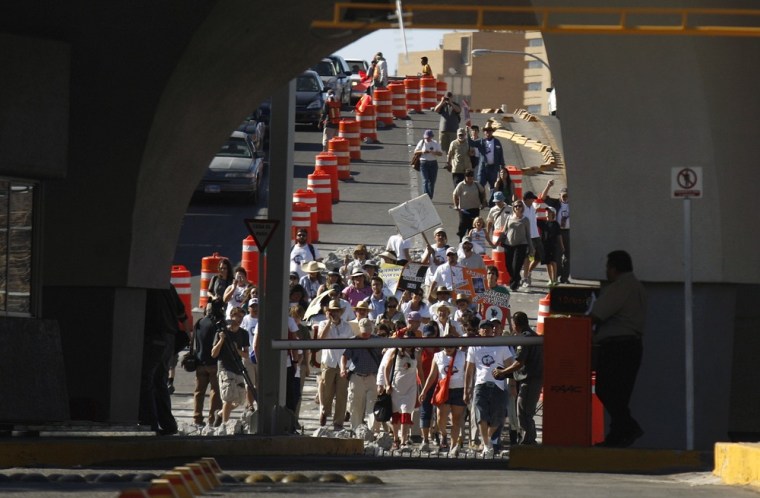Following the recent arrests of drug cartel suspects, the United States on Friday warned Americans traveling to or from Chihuahua, Mexico, that U.S. border crossings and the local consulate could become the targets of attacks.
"Information has come to light that suggests a cartel may be targeting the U.S. Consulate in Ciudad Juarez or U.S. Ports of Entry," the consulate said in a statement Friday. "In the past, cartels have been willing to utilize car bombs in attacks. We ask American citizens to remain vigilant."
On Tuesday, 21 people were gunned down in drug violence around Ciudad Juarez. That made it the bloodiest day of 2011 so far, surpassing 20 killings reported Feb. 18.
Ciudad Juarez, which sits across the border from El Paso, Texas, is a sprawling industrial city that has been plagued by violence as rival drug cartels fight over turf and smuggling routes.
A growing number of locals are making long-shot bids for political asylum next door in the United States.
More than 9,300 people have been gunned down, mutilated or beheaded there since early 2008 when the rival Juarez and Sinaloa cartels began an all-out war for rich trafficking routes.
That conflict has unleashed further violence as local gangs battle over street corner drug rackets, and turn to kidnapping and extortion. The Mexican military and federal police sent to curb the mayhem are also blamed by many residents for killings and other abuses.
Amid the violence, asylum requests from Mexico reached a record 5,551 last year, according to U.S. government figures, more than a third up on 2006 when President Felipe Calderon took office and sent the military to crush the cartels. Just 165 asylum requests were granted in 2010.
Among the wave of panic-stricken asylum seekers are muckraking journalists who chronicle brutal gang warfare in Ciudad Juarez and Mexico's northern Chihuahua state, police officers tasked with curbing the violence, and rights campaigners clamoring for justice.
Among those seeking refuge in the United States is Marisol Valles, a criminology student once dubbed the "bravest woman in Mexico" after she volunteered to become police chief of Praxedis G. Guerrero, near Ciudad Juarez, after her predecessor was tortured by drug cartels and then beheaded.
But after only five months on the job, Valles fled with her family to Texas in March after she received telephone death threats, apparently from a drug gang.
To gain asylum status, refugees have to prove a "well-founded fear" of persecution on the basis of race, religion, nationality or as a member of a specific social group or political opinion -- and for many fleeing Mexico, it's a long shot.
